In Victorian England ‘Unfortunate’ was an accepted euphemism for prostitute.
Work among the fallen as seen in the prison cell
Collapse
X
-
-
Originally posted by Herlock Sholmes View Post
In Victorian England ‘Unfortunate’ was an accepted euphemism for prostitute.
Prompt regression!

In the Victorian era the term ‘Unfortunate’ meant prostitute and nothing but prostitute. This has been proven beyond a shadow of a doubt.
And you have been proved wrong, beyond a shadow of a doupt.
The Baron
Comment
-
That's true. Very true. The point has been proven, proven several times over, so it just becomes tedious for everyone to make it again. Sometimes, when you look at Casebook you see four or five threads stretching endlessly from the past and heading way into the future, and just rehashing the same old arguments over and over. This'll head that way too, unless one resists the temptation to, er, quietly disagree.Originally posted by Mark J D View Post
A troll is an energy vampire, that's all.
It's the easiest thing in the world to defeat.
Yet the Third Law of the Internet is: 'Troll. Always. Wins.'
Because all people have to do when faced with an energy vampire is *walk away* ... and *they can't*...
M.
Comment
-
-
Yes, I’ve wasted enough time on idiotic and dishonest posts.Originally posted by PaulB View Post
'Nuff said, Herlock. 'Nuff said. When there is something said that's moderately worth replying to, reply. Until then, life' short. Herlock Sholmes
Herlock Sholmes
”I don’t know who Jack the Ripper was…and neither do you.”
Comment
-
Taking after a point from Katherine Crooks essay, I am interested in the function and meaning of the phrase 'unfortunate class'. The phrase was in use prior to 1888, but it increases hugely from September and October 1888 in the newpapers. Suggesting in the way that the case was reported as well as the term 'unfortunate' in its meaning of a prostitute did have a class dimension to it.
This is from 'The Sporting Times' on Saturday 24 November 1888.
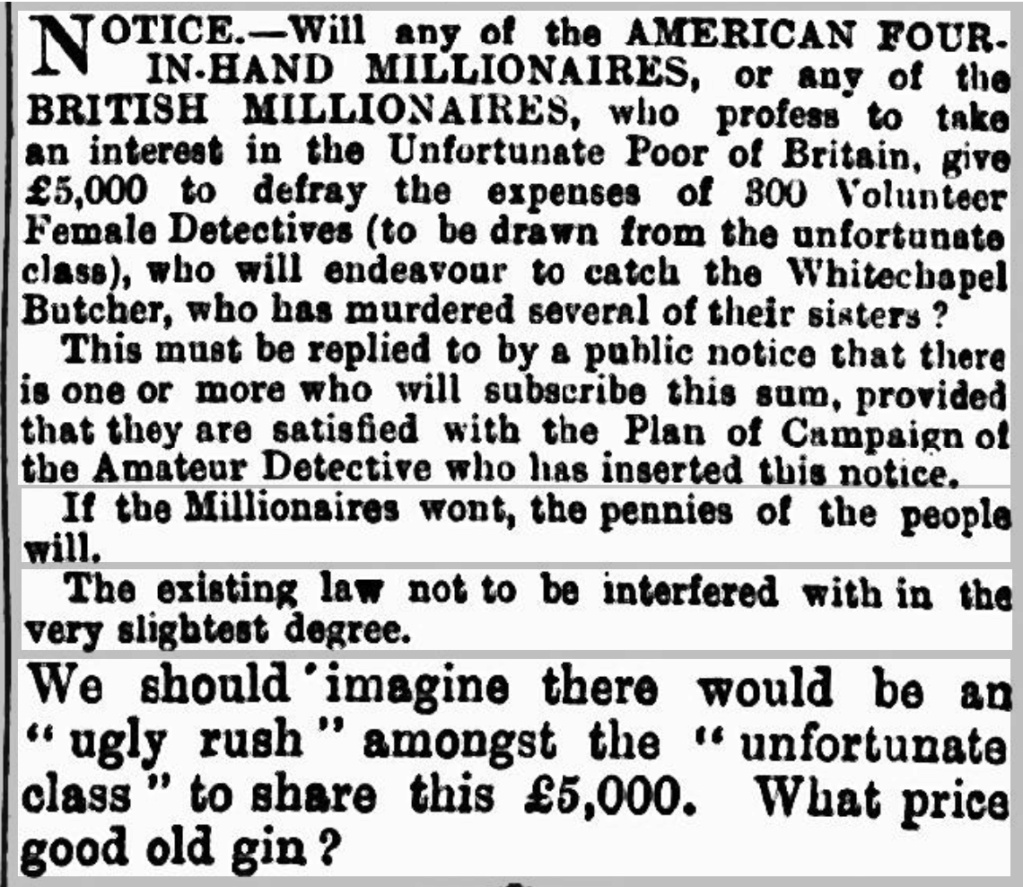
300 volunteer detectives to be recruited from the 'unfortunate class' to share £5000? Is the last question a suggestion it would all be spent on 'good old gin'?
I wonder if the 'Amateur Detective' who placed this ad is being entirely serious.
Comment
-
Could the term 'unfortunate class,' or 'poor unfortunates' be terms that in 1888 had evolved away from the former understanding of the noun 'an unfortunate,' used to describe a woman who was engaged in prostitution? And if that is the case, how we decide who understood the term in either sense? For instance, what did Mary Ann Cox understand the term to mean when she gave evidence that she was an "unfortunate" and had left the shelter of her house a couple of different times, late at night and early in the morning in cold, wet weather in November? And what would the police of 1888 understand by that statement she gave?Originally posted by seanr View PostTaking after a point from Katherine Crooks essay, I am interested in the function and meaning of the phrase 'unfortunate class'. The phrase was in use prior to 1888, but it increases hugely from September and October 1888 in the newpapers. Suggesting in the way that the case was reported as well as the term 'unfortunate' in its meaning of a prostitute did have a class dimension to it.
*snore alert* [for example of an official use of the word ]
I quickly looked through a couple of HO files from the early 1800s and one of the first ones I looked at was a reply to a petition for John Boyce in 1829, HO 17/50/6 a felon under sentence of death of death at Newgate. In reply to his petition it states a couple of interesting things:
"That your petitioner was tried and convicted at the last Old Bailey September sessions for a robbery committed on Thomas Niner in a house of ill fame"
"That your petitioners wife was an unfortunate woman and that the prosecutor accompanied her to your petitioners lodgings where the robbery took place"
Checking this against the Old Bailey record of the case, where the term 'unfortunate' does not appear-but in the actual trial session the definition of Boyce's wife as 'an unfortunate' and it meaning she engaged in prostitution is supported in the evidence given.
https://www.oldbaileyonline.org/brow...oyce#highlight
THOMAS GARDNER NINER . I am clerk and warehouseman to Messrs. Wood and Co., of Wood-street Cheapside. On the 24th of July, at near twelve o'clock at night, I fell in with a woman - she was a stranger to me; she accosted me, and I eventually accompanied her home - she took me to Chequer-alley, Bunhill-row ; she appeared to be a girl of the town - I was not tipsy, but a little elevated; I had been supping with a friend - I had my senses about me; I went to bed with her - I could not go to sleep, for I fancied I heard a noise in the room; it was an up stairs room - I think it was two pairs of stairs; I am almost certain of that - at last a man made his appearance before me from a cupboard; it was rather a large room, fifteen or sixteen feet long, I should think - when the man made his appearance the woman was in bed with me.Last edited by Debra A; 12-22-2021, 09:13 AM.
Comment
-
Okay, after checking a few more early 1800 HO [Home Office] records for the use of 'unfortunate,' I noticed that the word was also used to describe men and children but almost always in the context of someone who had been transported or had served a prison sentence.
Comment
-
The pattern is very easy to see in a newspaper index, in this case the British Newspaper Archive. The archive covers the years 1750 - 2021. A search for the phrase 'unfortunate class' conducted today on 22nd of December, 2021 returns the following results by the half-century:Originally posted by PaulB View PostThe murders presumably drew more attention in more newspapers to the subject, so one would expect an increase for that reason. How was the increase calculated?
1750 - 1799 - 1 entry
1800 - 1849 - 3042 entries
1850 - 1899 - 11529 entries
1900 - 1949 - 3111 entries
1950 - 1999 - 79 entries
2000 - 2021 - 1 entry
Even allowing for the fewer articles in the index for the years 1750 - 1799 and for the current time (2000 - 2021 not being a full fifty years) the data does suggest a phrase coming into common usage in the early nineteenth century and dying out in the early twentieth century, with a large peak in the late nineteenth century.
So digging into the decades of the years 1850 - 1899 gives the following:
1850 - 1859 - 2227 entries
1860 - 1869 - 2777 entries
1870 - 1879 - 1420 entries
1880 - 1889 - 2558 entries
1890 - 1899 - 3045 entries
OK, this isn't as 'peaky' although the 1890s have the most entries. It's pretty active in 1850 - 1869, then seems to trail off and return again in 1880 - 1889. Looking at the individual years of 1880 - 1889 reveals:
1880 - 158 entries
1881 - 193 entries
1882 - 188 entries
1883 - 141 entries
1884 - 145 entries
1885 - 162 entries
1886 - 184 entries
1887 - 139 entries
1888 - 809 entries
1889 - 439 entries
The months of 1888:
January - 13 entries
February - 21 entries
March - 10 entries
April - 20 entries
May - 7 entries
June - 6 entries
July - 7 entries
August - 32 entries
September - 167 entries
October - 258 entries
November - 150 entries
December - 118 entries
This is obviously a cursory analyiss, treating newspapers as the log files of social attitudes and phrasing, but there's enough to suggest there's signal rather a noise in the data, imho.
I'm interested here in the meaning of the phrase 'unfortunate class', in that 'unfortunate' is used as a euphemism for prostitute for sure, but also relates to 'fallen woman'. All of these words (prostitute, unfortunate and 'fallen woman') are loose in their definition.
'Unfortunate class' is of interest as it seems to imply either 'the set of women who are prostitutes' or 'the social class of which the women are almost certainly prostitutes'. I think both meanings of this particular phrase in different contexts can be demonstrated. I'm interested in the conceptualisation of the prostitute as belonging to a distinct and seperate class to other women. And also the conditions by which a woman would be judged to be a member of that class.
The statements where a woman describes herself in the terms 'I am an unfortunate' and the term by which someone appears to pass judgement 'you are an unfortunate' as well as in general terms like 'this district is now frequented by the lowest women of the unfortunate class', are saying subtletly different but quite distinct things. Again, in my opinion.Last edited by seanr; 12-23-2021, 12:02 AM.
Comment
-
Just a guess, but I wonder if the term 'unfortunate' as a euphemism for prostitute, might be related to a 17th Century ballad 'The Unfortunate Concubine,' about Jane Shore, the mistress of Edward IV. It certainly supplies an early link between a concubine and an unfortunate person.
I read an 1857 editorial from the UK arguing that an unfortunate was a repentant prostitute--a Magdalene. If you weren't repentant, you evidently weren't an unfortunate! Somewhere along the lines being repentant was no longer a prerequisite--most people realized you hated it anyway, even if you couldn't afford to repent.
Comment
-
Worcestershire Chronicle - Saturday 16 July 1887 contains a report on the enquiry of the conduct of Police Constable Endacott on his arrest of a Miss Elizabeth Cass, conducted by Sir Charles Warren.Originally posted by Trevor Marriott View Post
The police belived it because they clearly had evidence to support that belief which the document I posted clearly shows, as does the death cert of Kelly and the wealth of other corroborative evidence to show these women were on the game.
Lets be sensible about this point I am sure the police did not just go out and label every unfortuate woman as a prostitute, why would they do that what would it achieve, there was a caution process they applied before any prostitute was even taken to court. I am aware that this whole issue was created by Rubehold who is using this to add weight to her making a case for these women to be so hard done by that they had no where to go and no one to care for them.
www.trevormarriott.co.uk
Sergeant Cumber was the acting inspector who filled out the charge sheet recording the occupation of the Elizabth Cass as 'Common Prostitute' and education level as 'Imperfect'. When questioned as to why her occupation was recorded as such, Sergeant Cumber replied she had not anwered when asked her occupation and Constable Endacott had said she was a prostitute.
Superintendent Cutbush gave evidence and was questioned by what right a Constable could describe a woman as a 'common prostitute'.
Sir Charles Warren raised the point about the police bringing a charge against a woman on the testimony of one man.Originally posted by Superintendent CutbushHe could only do so from his own knowledge of her as such
Originally posted by Superintendent CutbushThe custom is for the evidence of the constable to be accepted, and many hundreds are convicted on the testimony of the constable.It' a very long article so some choice snippets.Originally posted by Sir Charles WarrenUnder the police Regulations Act of the metropolis, a constable is empowered to take into custody any one soliciting in the streets when it is done in his view... ... The magistrates have decided that the evidence of one constable is sufficient.
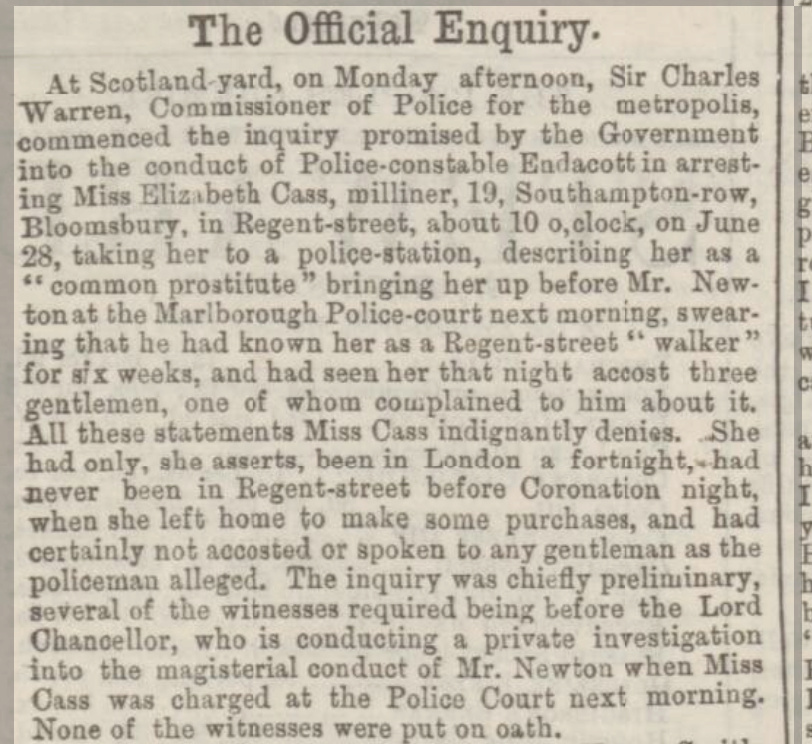
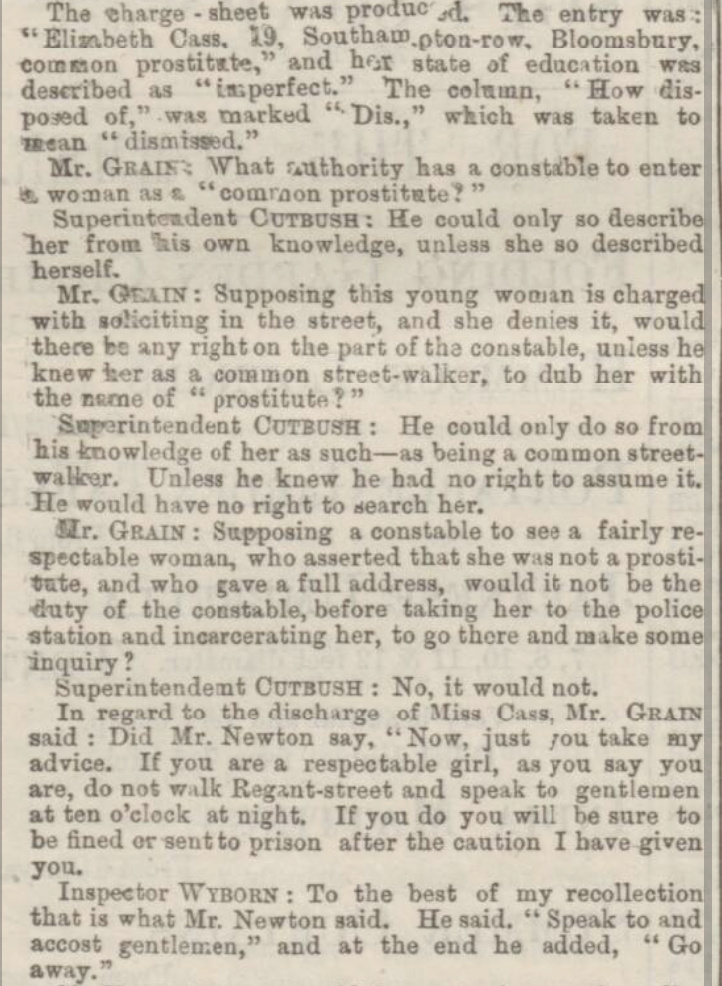
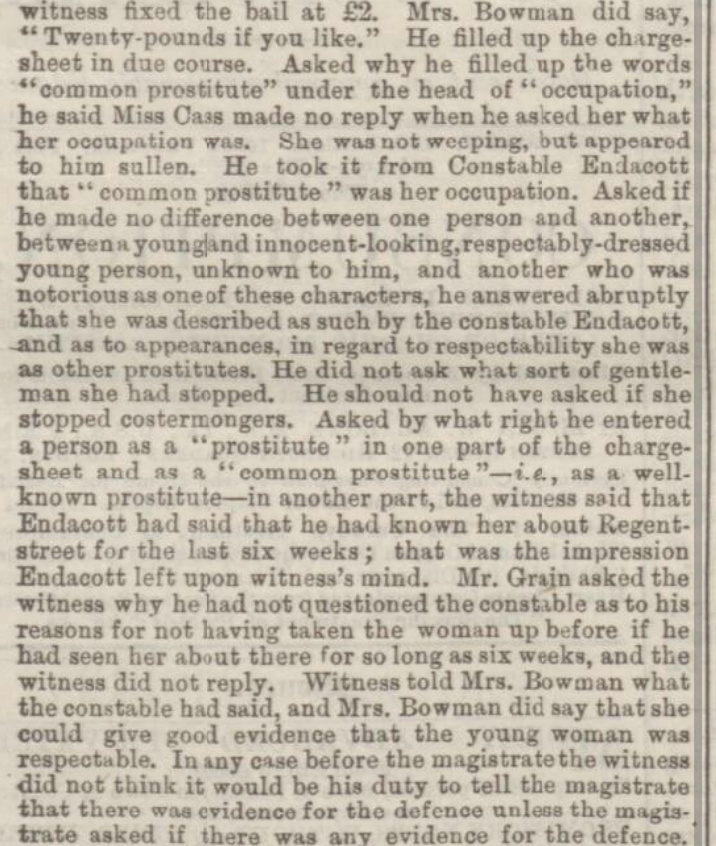
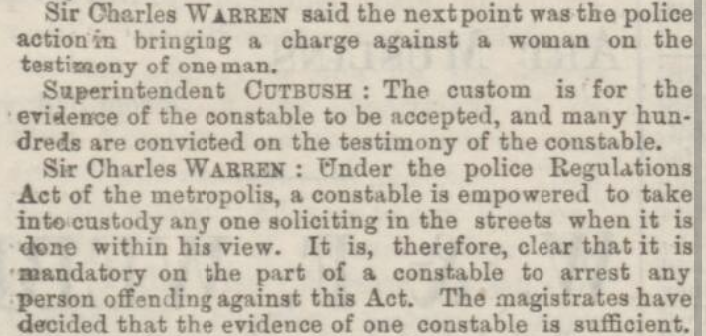
There is no case to be made that because a document recording occupation as prostitute mean that there must have been good evidence to do so. At the time, the testimony of a single police constable was sufficient, even for bringing a charge in front of a magistrate.

Comment
-
I have asked this earlier in the thread and it still interests me too- -How do we go about determining the understanding of the use of 'unfortunate' by police and the women who described themselves as such? Is it solely the press here who have created and promoted this idea of an 'unfortunate class' and lumped all homeless, destitute women in to it, widening the meaning in line with conversations opened up by the Whitechapel murders and the appalling conditions people lived in?Originally posted by seanr View Post
The pattern is very easy to see in a newspaper index, in this case the British Newspaper Archive. The archive covers the years 1750 - 2021. A search for the phrase 'unfortunate class' conducted today on 22nd of December, 2021 returns the following results by the half-century:
1750 - 1799 - 1 entry
1800 - 1849 - 3042 entries
1850 - 1899 - 11529 entries
1900 - 1949 - 3111 entries
1950 - 1999 - 79 entries
2000 - 2021 - 1 entry
Even allowing for the fewer articles in the index for the years 1750 - 1799 and for the current time (2000 - 2021 not being a full fifty years) the data does suggest a phrase coming into common usage in the early nineteenth century and dying out in the early twentieth century, with a large peak in the late nineteenth century.
So digging into the decades of the years 1850 - 1899 gives the following:
1850 - 1859 - 2227 entries
1860 - 1869 - 2777 entries
1870 - 1879 - 1420 entries
1880 - 1889 - 2558 entries
1890 - 1899 - 3045 entries
OK, this isn't as 'peaky' although the 1890s have the most entries. It's pretty active in 1850 - 1869, then seems to trail off and return again in 1880 - 1889. Looking at the individual years of 1880 - 1889 reveals:
1880 - 158 entries
1881 - 193 entries
1882 - 188 entries
1883 - 141 entries
1884 - 145 entries
1885 - 162 entries
1886 - 184 entries
1887 - 139 entries
1888 - 809 entries
1889 - 439 entries
The months of 1888:
January - 13 entries
February - 21 entries
March - 10 entries
April - 20 entries
May - 7 entries
June - 6 entries
July - 7 entries
August - 32 entries
September - 167 entries
October - 258 entries
November - 150 entries
December - 118 entries
This is obviously a cursory analyiss, treating newspapers as the log files of social attitudes and phrasing, but there's enough to suggest there's signal rather a noise in the data, imho.
I'm interested here in the meaning of the phrase 'unfortunate class', in that 'unfortunate' is used as a euphemism for prostitute for sure, but also relates to 'fallen woman'. All of these words (prostitute, unfortunate and 'fallen woman') are loose in their definition.
'Unfortunate class' is of interest as it seems to imply either 'the set of women who are prostitutes' or 'the social class of which the women are almost certainly prostitutes'. I think both meanings of this particular phrase in different contexts can be demonstrated. I'm interested in the conceptualisation of the prostitute as belonging to a distinct and seperate class to other women. And also the conditions by which a woman would be judged to be a member of that class.
The statements where a woman describes herself in the terms 'I am an unfortunate' and the term by which someone appears to pass judgement 'you are an unfortunate' as well as in general terms like 'this district is now frequented by the lowest women of the unfortunate class', are saying subtletly different but quite distinct things. Again, in my opinion.
Mary Ann Cox was obviously describing herself in specific terms as a prostitute, and if Mary Ann Cox was asked to describe someone like Elizabeth Prater, for example, would someone like Mary Ann Cox use the term unfortunate to indicate Prater was a prostitute or in more general terms as being of the class of women unfortunates belonged to? Also, how would the police be most likely to apply the term unfortunate, to a woman, given that it apparently had an obvious meaning as prostitute used in courts and legal documents?
Comment
-
Bristol Mirror - Saturday 23 October 1813
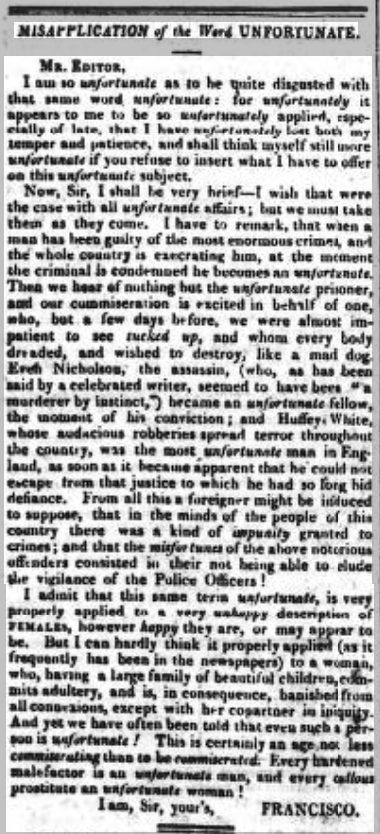
Francisco seems vexxed at the use of the word 'unfortunate' being used to refer to criminals of late. I note also the use of the term 'callous prostitute' and 'unfortunate woman' in reference to a woman who commits adultery and not who exchanges sex for payment.
In the 19th century understanding, could the word 'prostitute' and so perhaps also 'unfortunate' be applied to a woman who is sexually active with men other than their legal husband?
Comment

Comment